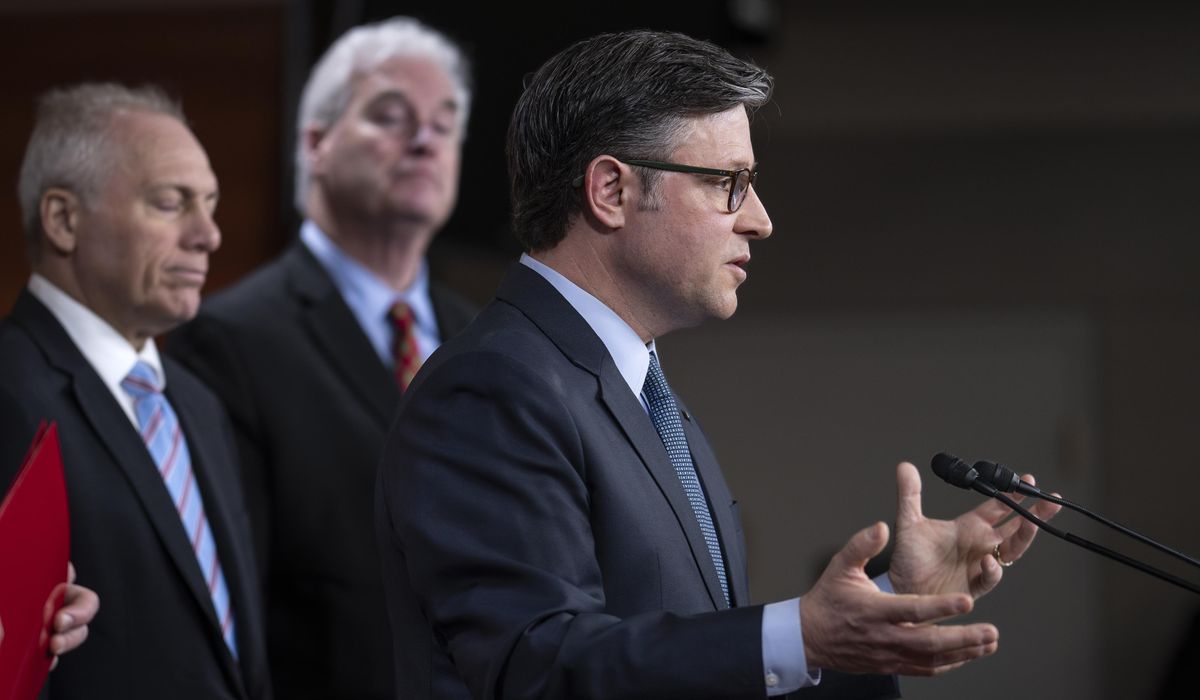


House Speaker Mike Johnson’s plan to attach a raising of the nation’s debt limit to a colossal border, tax and energy package is in flux, a sign that the key priority for President-elect Donald Trump may be meeting resistance among Republicans.
Where the debt limit will end up has become increasingly fluid as negotiations for the broader reconciliation package move forward. Mr. Johnson, Louisiana Republican, said last week that he intended to include the extension into the mix with Mr. Trump’s other priorities.
Flash forward a week, and his position has begun to shift.
“That’s the current plan and we’re socializing that amongst members,” Mr. Johnson said. “I’m not really wed to that, it was an initial idea, so we’ll see how it goes.”
The idea of using the filibuster-proof budget reconciliation process as a vehicle to raise the debt limit means that Republicans would not need to negotiate with Democrats, which could entice a sliver of the House GOP that has never voted to do so to get on board.
It’s also a reason the speaker made his intention known last week that he wanted to handle the issue during the reconciliation process.
In December, Mr. Trump demanded that Mr. Johnson infuse a government-funding extension with legislation that would tackle the debt limit. At the time, he wanted the issue dealt with before he took office.
Republican debt hawks shut down that push, and instead agreed to consider a two-year extension, that would also involve a $1.5 trillion increase in the statutory borrowing limit on the condition that there be $2.5 trillion in spending cuts over the next decade.
Lawmakers could try to tackle the debt limit as a separate standalone bill, much to hardliners’ chagrin, like Congress did in 2023 when former Speaker Kevin McCarthy and President Biden landed on a deal to extend the waiver of the debt limit until this year.
One option floated by the speaker would be attaching the debt-limit waiver to an expected supplemental emergency-spending package for wildfire aid. That could generate bipartisan support for the polarizing issue in the event that Republicans can’t coalesce around a plan.
So far Democrats have pushed back against that plan, accusing Republicans of trying to condition aid for California.
Rep. Jay Obernolte, California Republican, said that he didn’t view that plan as “conditioning one against the other.”
“Well, we’re going to get California the aid that it requires,” he said. “The question is what is the correct vehicle for doing that?”
Mr. Johnson also acknowledged that there wasn’t consensus among Republicans on that strategy, either.
Finding unity on the best approach to tackle the debt-limit dilemma will be a difficult ask in a typically fractured conference, especially with the House GOP armed with a historically thin majority.
“Look, everybody understands that we have to be realists here,” Mr. Johnson said. “None of us are going to get all of our preferences in this legislation, but we’re also not going to compromise core principles. So there’s got to be consensus built, and we only have, you know, maybe one vote to spare. So it’s going to take a lot of time.”
Many House Republicans, spanning the gamut of more moderate members and hardliners, are partial to dealing with the issue in reconciliation because they could avoid spending and policy concessions to their Democratic counterparts.
“My position is the debt ceiling should be passed as part of reconciliation so that we don’t have to deal with [Senate Minority Leader] Chuck Schumer,” House Freedom Caucus Chair Andy Harris told The Washington Times.
Mr. Harris and other members of the Freedom Caucus who are hawkish on slashing spending want Mr. Johnson to make good on the handshake agreement to include steep spending cuts.
Some see a possible pivot in position as an organic part of the process, while others are concerned about giving Democrats leverage.
“They’ll extract their pound of flesh if they’re allowed to have leverage,” Rep. Andrew Clyde, Georgia Republican, told The Times. “So I think it’s important that we use it on a bill where they have the least amount of leverage, and I believe that reconciliation, at this point, seems to be the best vehicle for that.”
• Alex Miller can be reached at amiller@washingtontimes.com.
